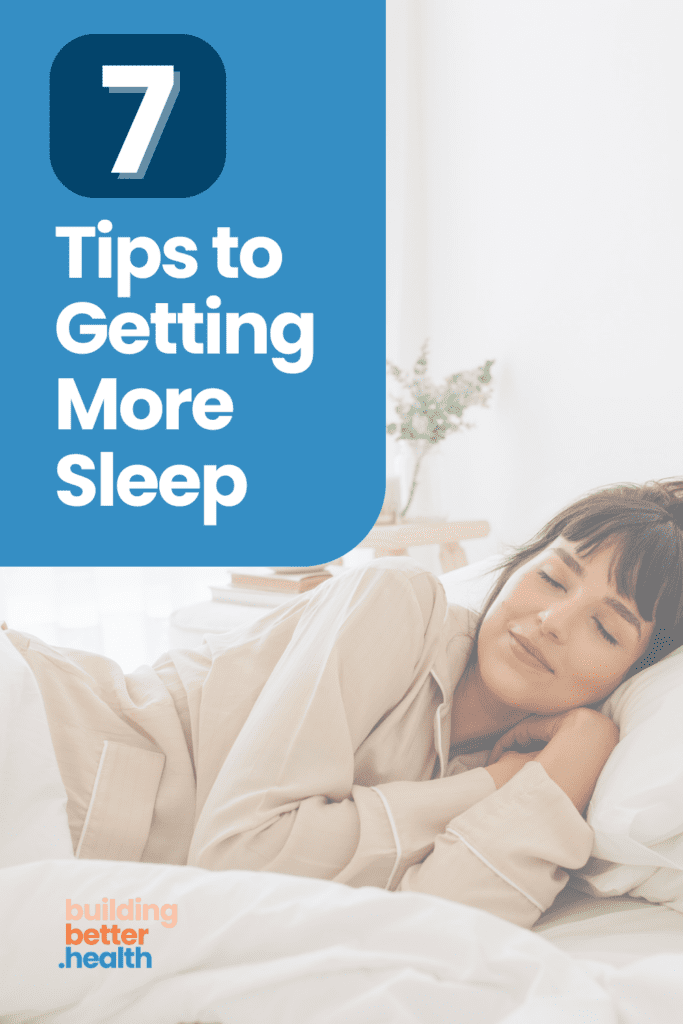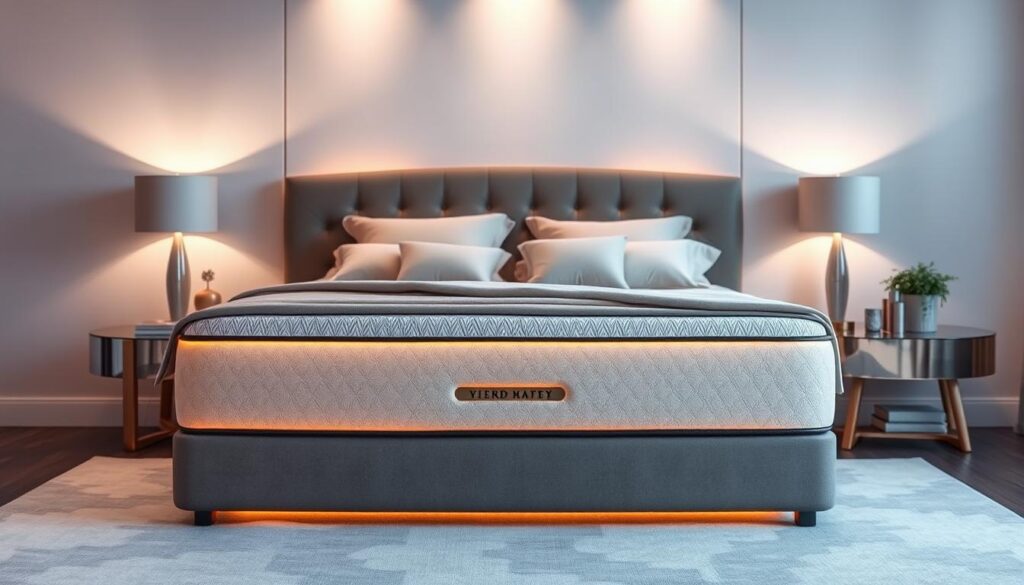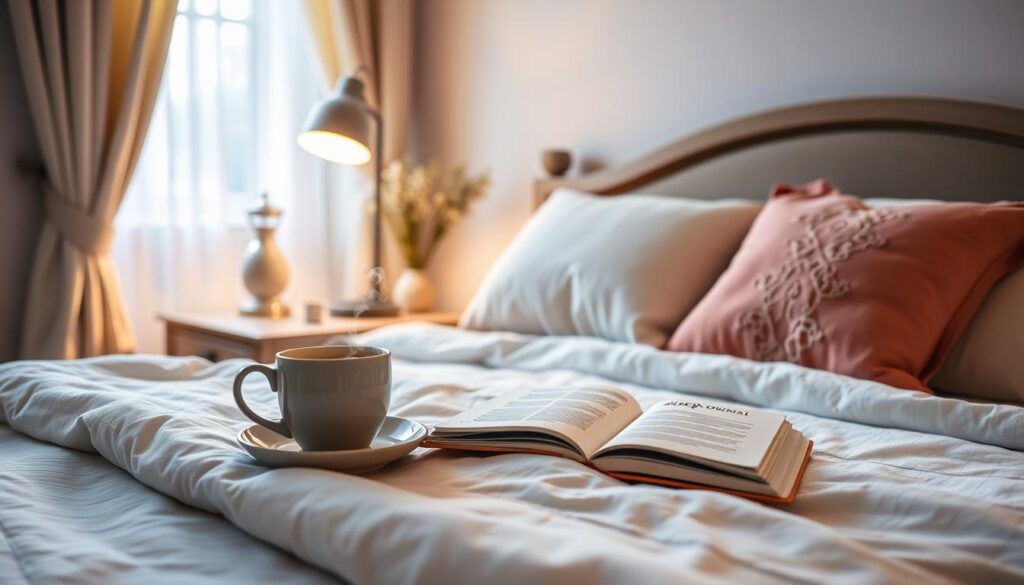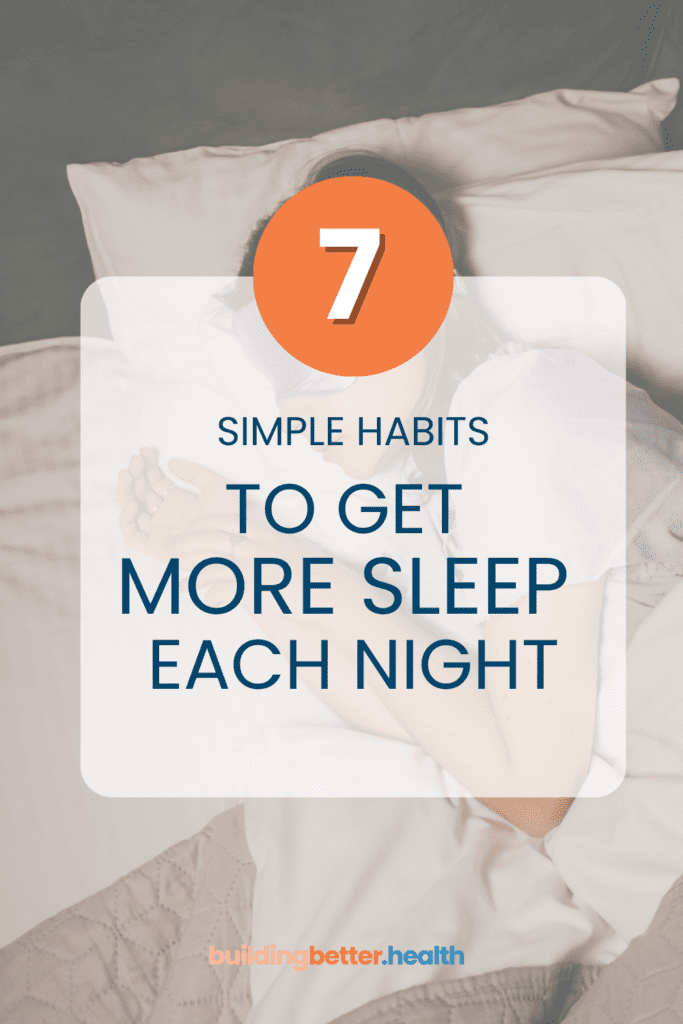
Please note: This website contains affiliate links. As an Amazon Associate, we earn from qualifying purchases at no additional cost to you.
Did you know that 50 to 78% of athletes struggle with sleep? About 22 to 26% have very disturbed sleep. This shows how vital it is to get more sleep and develop healthy habits. Whether you’re an athlete or just want better sleep, learning about sleep tips can greatly improve your health, mood, and productivity.
Getting better sleep is more than just going to bed early. It’s about understanding your sleep cycles and making your sleep space the best it can be. It’s also about sticking to good sleep habits every day. By recognizing sleep’s role in your health and using helpful advice, you can enjoy the many benefits of a good night’s sleep.
Understanding Sleep Cycles for Better Rest
Sleep cycles are key to a good night’s sleep. They switch between non-rapid eye movement (NREM) and rapid eye movement (REM) sleep. Each cycle lasts 90 to 120 minutes. With eight hours of sleep, you get four to five cycles.
Stages of Sleep: REM and NREM
NREM sleep has three phases, each important for repair and boosting the immune system. Stage 2 NREM sleep makes up about 45% of sleep time. Stage 3 deep sleep is around 25%.
REM sleep, where dreams happen, makes up the rest, about 25%. Knowing about these cycles helps improve sleep quality.
The Importance of Deep Sleep
Deep sleep, or slow-wave sleep, is vital for the body’s repair. It’s when growth hormone is released and glucose metabolism is regulated. It also helps with muscle building and memory.
Having the right mix of NREM and REM sleep is crucial. It affects both mental and physical health. This balance is key to better sleep.
Age, sleep disorders, and alcohol can affect sleep. It’s important to understand each stage. This helps create a sleep routine that boosts both REM and deep sleep.

Creating the Optimal Sleep Environment
Creating a great sleep environment is key to better sleep. Focus on bedroom temperature, light, and decor. This can greatly improve your rest. Let’s explore how to make your bedroom a place for relaxation and rest.
Maintaining a Cool Bedroom
Temperature is important for deep sleep. Keep your bedroom cool, between 60 to 67 degrees Fahrenheit. This helps your body cool down, making you sleepy.
- Optimal sleep temperature: 60 to 67 degrees Fahrenheit
- Benefits: Enhanced melatonin production and deeper sleep
- Tip: Experiment with different settings to find your ideal temperature
The Power of Darkness
Darkness is crucial for a good night’s sleep. It helps your body’s natural sleep cycle. Avoid blue light from screens to signal your brain it’s time to sleep. Blackout curtains can block out any light.
| Light Exposure | Impact on Sleep |
|---|---|
| Natural light (10+ lux) | More nocturnal awakenings |
| Blue light before bedtime | Reduced melatonin production |
Neutral and Calming Colors
The colors in your bedroom also matter. Use light shades of green, blue, or yellow. These colors are calming and help you relax.
“Calm surroundings contribute to a restful mind, paving the way for better sleep.”
Creating a great sleep environment is about more than just temperature. It’s about darkness and colors too. Tailor your space for the best sleep experience.
Tips for Better Sleep Hygiene
Good sleep hygiene is key for better sleep. Adding these habits to your day can boost sleep quality and health.
Consistent Sleep Schedule
Keeping a regular sleep schedule is crucial. Try to sleep and wake up at the same time every day. This helps your body’s clock stay in sync. Most adults need 7-8 hours of sleep each night.
Limiting Electronic Use Before Bed
Reducing screen time before bed is important. Devices like phones and computers can stop melatonin production. This makes it tough to fall asleep. It’s best to turn off screens an hour before bed and do something relaxing instead.
Avoiding Stimulants Like Caffeine
Stimulants like caffeine and nicotine can mess with sleep. Caffeine’s effects can last 3-7 hours, so avoid it close to bedtime. Nicotine in cigarettes also disrupts sleep.
By following these tips, you can create a better sleep environment. This leads to more restful nights.
Getting More Sleep: Practical Advice
Getting better sleep is key for health and happiness. Many face challenges like stress, diet, and lifestyle. By using certain strategies, you can improve your sleep quality and length. We’ll explore how regular exercise and mindfulness can help.
Regular Physical Activity
Regular exercise is a top way to better sleep. It makes you tired at night, helping you sleep faster. But, avoid intense workouts before bed as they can keep you awake.
Instead, choose moderate activities like a brisk walk or yoga in the day. This way, you get the sleep benefits without trouble falling asleep.
Mindfulness and Relaxation Techniques
Mindfulness and relaxation can calm your mind and body for sleep. Practices like meditation, deep breathing, and progressive muscle relaxation reduce stress and anxiety. A bedtime ritual with these can greatly enhance your sleep.
- Deep Breathing Exercises: Slow, deep breaths calm your nervous system and prepare your body for sleep.
- Progressive Muscle Relaxation: Tensing and then releasing each muscle group relieves physical tension.
- Guided Meditation: Guided meditation apps or recordings help focus your mind and reduce thoughts.
Investing in a Quality Mattress
Getting a good night’s sleep is key, and a quality mattress is essential. Adults need 7-9 hours of sleep each night. A good mattress can help you get that sleep comfortably. New mattress technologies, like memory foam and latex, offer personalized support for better sleep.

Sleep is crucial for health. Not getting enough sleep can lead to serious diseases like heart disease and high blood pressure. A quality mattress supports your spine and reduces discomfort. For example, a medium-firm mattress can make you feel more comfortable and aligned, leading to better sleep.
Modern mattress technology, like cooling mattresses, helps keep your body at the right temperature. This is important because overheating can disrupt sleep. Memory foam mattresses also help by isolating motion, which is great for couples.
Research shows that sleeping on a medium-firm mattress is best for comfort, spinal alignment, and quality sleep. Studies have found that memory foam mattresses can help reduce pain and make falling asleep easier.
The Role of Diet in Sleep Quality
Knowing how diet affects sleep is key to better rest. Short sleepers, those sleeping less than 7 hours, eat smaller meals. They have less protein, carbs, fiber, and fats than those sleeping 7-8 hours. These eating habits can really affect sleep and health.
Foods That Promote Sleep
Some foods help you sleep better. Foods like turkey, almonds, and milk boost melatonin, a sleep hormone. Kiwi, tart cherries, oily fish, and eggs also help sleep.
Eating lots of veggies and whole grains can also improve sleep. But, foods high in sugar, fats, and low in fiber can hurt sleep. Avoiding caffeine and alcohol before bed is also good.
The Mediterranean diet, full of fruits, veggies, and healthy fats, is linked to better sleep. It also reduces insomnia symptoms.
The Timing of Your Last Meal
When you eat affects sleep. Eating a big meal before bed can make it hard to fall asleep. It’s better to have light snacks in the evening if you’re hungry.
Simple carbs like whole grains and fruits eaten 4 hours before bed help sleep. But, avoid high-sugar and high-carb foods before bed. They can make sleep worse.
Irregular eating and skipping breakfast also hurt sleep. Eating regular meals and choosing balanced foods helps keep a good sleep routine.
In short, eating well and timing meals right are important for sleep. Eating sleep-promoting foods and eating at the right times can improve rest and health.
Evaluating Your Sleep Routine
It’s important to check your sleep evaluation often to keep your sleep good. Look at your sleep area’s temperature, noise, and light. Also, make sure your bed is comfy. A bad bed can make it hard to sleep well.
Knowing if you’re a morning or night person helps you sleep better. Staying regular with your sleep times is key. Try to wake up when it’s light and go to bed when it’s dark.
Signs like taking too long to fall asleep can show your sleep isn’t great. It should take less than 20 minutes to fall asleep for a good night.
For deeper checks, there are tools like the Pittsburgh Quality Sleep Index (PSQI). It looks at seven areas of sleep. Doctors use tests like polysomnography to find sleep problems.

Driving while tired can cause accidents, injuries, or even death. This shows how important a good sleep routine is.
Checking your sleep often can show what needs work. Here’s a table with key sleep quality signs:
| Indicator | Optimal Measure | Poor Measure |
|---|---|---|
| Time to Fall Asleep | < 20 minutes | > 30 minutes |
| Time Awake in Bed | < 15% | > 15% |
| Sleep Duration | ≥ 7 hours | < 5 hours |
| Consistency of Sleep Schedule | Regular | Irregular |
By checking your sleep routine often and making changes, you can sleep better. This leads to better health and daily life.
Addressing Common Sleep Disturbances
Sleep disturbances are common and affect many people’s lives. Understanding conditions like insomnia and sleep apnea can help improve sleep and well-being.
Dealing with Insomnia
Insomnia makes it hard to fall and stay asleep. It affects about one-third of adults, with 10 to 15% struggling during the day. To fight insomnia, it’s key to avoid caffeine and alcohol before bed. Regular exercise also helps sleep better.
Cognitive Behavioral Therapy (CBT) is the best treatment for chronic insomnia. It helps change negative thoughts and behaviors that disrupt sleep.
“Only about 30% of high school students get at least eight hours of sleep on an average school night.”
CBT is not the only solution. Lifestyle changes like a consistent sleep schedule and relaxation techniques are also effective. Mental health issues like anxiety and depression can also affect sleep, making it important to address them.
Understanding Sleep Apnea
Sleep apnea affects over 50 million Americans. It’s marked by snoring and daytime tiredness. Continuous Positive Airway Pressure (CPAP) therapy is a common treatment. It keeps airways open, preventing breathing pauses.
Along with CPAP, lifestyle changes like losing weight and avoiding alcohol and smoking before bed can help. These changes can reduce symptoms.
“More than 50 million Americans have chronic sleep disorders.”
To understand and compare insomnia and sleep apnea management, here’s a table:
| Aspect | Insomnia | Sleep Apnea |
|---|---|---|
| Primary Symptoms | Difficulty falling/staying asleep | Loud snoring, daytime drowsiness |
| Main Treatments | Cognitive Behavioral Therapy, Sleep Hygiene | CPAP Therapy, Lifestyle Changes |
| Additional Support | Relaxation Techniques, Regular Exercise | Weight Management, Avoiding Alcohol/Smoking |
In conclusion, to tackle insomnia and sleep apnea, it’s important to recognize symptoms and use effective treatments. Making lifestyle changes can also help. These steps can improve sleep quality and overall health, helping people stay asleep and rest well.
Conclusion
Getting a good night’s sleep is key for our health and happiness. Understanding sleep cycles and creating a great sleep space can really improve our lives. It’s not just about how long we sleep, but also how well we sleep.
Keeping a regular sleep schedule and avoiding screens before bed is important. Exercise and mindfulness also help us sleep better. These habits are crucial for a good night’s rest.
Dealing with sleep problems like insomnia and sleep apnea is important for our health. Sleep is as important as exercise or not having high blood pressure for living a long life. It helps our bodies repair and grow, which is vital for our health and mind.
For those who can’t sleep well, making small changes can help more than taking pills. Sleep is an investment in ourselves, making us feel better and think clearer. Sadly, one in three adults in America don’t get enough sleep, affecting their lives and health.
By taking a whole-body approach, we can all sleep better. For more tips on sleeping well, check out Good Sleep for Good Health.

FAQ
How can I get more sleep consistently?
Go to bed and wake up at the same time every day. This helps your body get into a routine. It makes your sleep better.
What are the stages of sleep, and why are they important?
Sleep has two main stages: NREM and REM. NREM sleep helps fix your body, while REM sleep is for dreaming and emotions. Deep sleep is key for fixing your body and memory.
How does maintaining a cool bedroom improve sleep?
A cool room, between 65 and 75 degrees, helps you sleep. It tells your body to make melatonin, the sleep hormone. A cool room helps you rest better.
Why is it important to limit electronic use before bed?
Devices give off blue light, which stops melatonin production. This makes it hard to fall asleep. Stop using devices an hour before bed for better sleep.
What role does regular physical activity play in better sleep?
Exercise tires your body, making it easier to sleep. It also lowers stress and anxiety, which can hurt your sleep.
How can a quality mattress affect my sleep?
A good mattress supports and comforts you, reducing pain that can wake you up. New technologies like cooling features keep you at the right temperature for sleep.
Which foods promote better sleep and why?
Foods like almonds, milk, and turkey have tryptophan. This helps make melatonin and serotonin, which help you sleep. Eating these foods can make it easier to fall asleep.
How should I time my last meal to avoid sleep disturbances?
Don’t eat big meals before bed. They can make it hard to sleep. Have a light snack if needed, and eat your main meal hours before bed.
What are some signs that I need to evaluate my sleep routine?
If you often can’t sleep, feel very tired, or your sleep place isn’t good, it’s time to change your sleep routine.
What can I do to address insomnia?
Try going to bed and waking up at the same time every day. Use relaxation techniques and avoid things that keep you awake. Getting help from a professional might also help.
How do I recognize and manage sleep apnea?
Look out for loud snoring, gasping for air, and feeling very tired during the day. Sleep apnea needs medical help, like a CPAP machine, and lifestyle changes like losing weight.
Please note: This website contains affiliate links. As an Amazon Associate, we earn from qualifying purchases at no additional cost to you.











